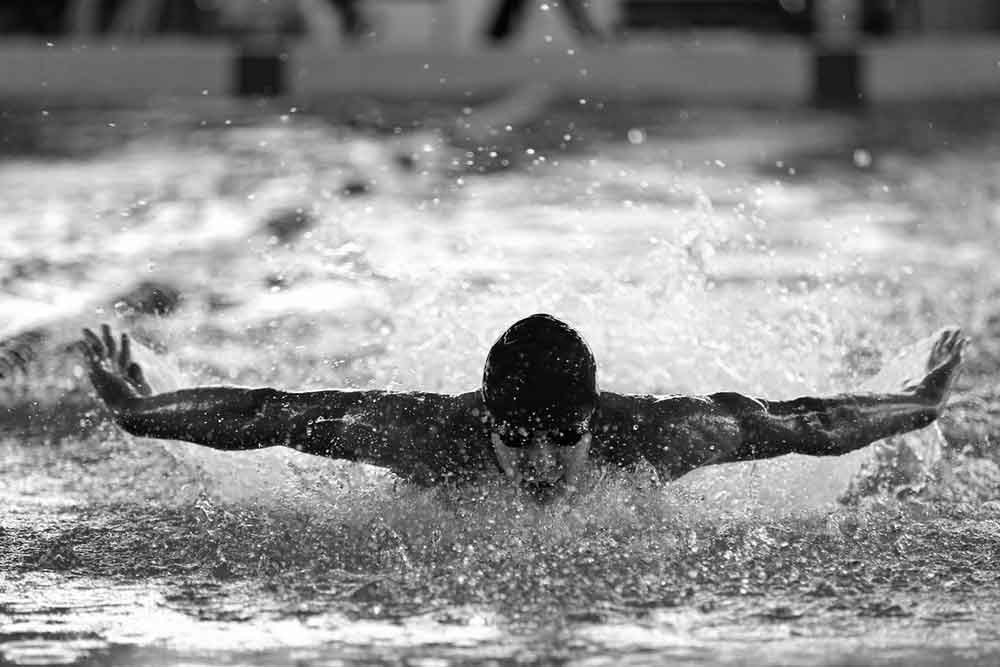A Review by Alyssa Bialowas
Caffeine is an ergogenic aid, meaning it’s a substance that may improve performance and stamina. Elite athletes often use ergogenic aids to enhance their energy and execution. Sprint swimmers have to perform repeated high-intensity races that require high amounts of energy, and moderate doses of caffeine have the potential to improve their sprint time.
Up until now, studies have mainly focused on moderate doses of caffeine and its effect on endurance athletes (Goods et al. 2017). There is a lack of field based investigations with elite athletes to determine the ability of caffeine to improve high-intensity performance in highly trained athletes (Burke, 2008). The question stands: Can caffeine, in fact, improve mean sprint time in elite swimmers?
The Study
Nine national-level male swimmers participated in this study. A three-week, single-blind, crossover study was designed where the swimmers performed 6 x 75 m freestyle sprints one-hour after consuming either caffeine or placebo. Both sessions during the two week trial were performed at the same time of day on the same day of the week and participants were asked not to train in the morning before testing. Participants were also asked not to consume caffeine in the 48 hours before each session. A sleep diary was kept for the week to assess the effect of each substrate on sleep.
The 6 x 75 m sprints commenced with a dive start and each swimmer was paired up to emulate competition. Capillary blood samples for the analysis of blood lactate concentration and pH were collected after the 1st, 3rd and 5th sprint before starting a between-sprint recovery of 2 x 100 m low intensity freestyle. Following every sprint, heart rate and perceived exertion were collected, and participants were asked which substrate they thought they consumed before that session. Sprint times were analyzed using sports video software and recorded to the nearest 0.02 s.
Related Article: The Effects Of Altitude Training On Competitive Swimmers
The Results
Results revealed a significantly improved sprint performance in the 3rd and 4th sprints when the swimmer took caffeine before their performance. They also found a moderate effect for improved mean sprint times with caffeine compared to placebo. There were no differences in blood pH or blood lactate concentration prior to capsule ingestion or after warm-up between caffeine and placebo.
There was a significant treatment effect for higher blood lactate concentrations with caffeine, and time effect, but no treatment*time effect. Blood pH was significantly lower in caffeine trials after the 1st and 5th sprint during the repeat-sprint trial, but not following the third set. Mean heart rate and self-perceived rating of exertion were not different between caffeine and placebo trials.
The Takeaway
Moderate caffeine ingestion improved mean sprint time during a 6 x 75 m freestyle repeat-sprint performance in elite male athletes. Further research should investigate caffeine’s effect on sprint athletes other than swimmers to see if the results hold true across elite athletes and in order to deem caffeine an effective ergogenic aid for elite sprint athletes.
Related Article: Are Thermogenic Dietary Supplements Safe & Effective For Resistance Training
You Might Like:
Walking After Eating: An Effective Way to Manage Blood Sugar
Over the last few years, Type II diabetes has become one of the biggest health concerns on the planet. Typified by an inability to correctly manage your blood sugar levels, it can have deleterious health...What Is the Hype About Antinutrients and Are They Harmful?
Ask and they will agree that fruits and vegetables are some of the healthiest foods on the planet – and for the most part, they would be right. They are full of vitamins and minerals,...The World’s Most Powerful Antioxidant: Glutathione
Over the last couple of years Glutathione has made a bit of splash in the supplement industry, where it has been touted as one of the most powerful products to hit the market in years....BCAAs (branched-chain amino acids): What You Need to Know
There are thousands of different supplements available for your consumption – all of which promise the world (many of which, unfortunately, fail to deliver on that promise). One supplement that has become a mainstay in...Intermittent Fasting and Running
Intermittent fasting has quickly become one of the most popular dietary strategies of the decade. Over the last few years, it has evolved from a niche topic into something that everyone is doing. And with...3 Vitamins to Boost Your Immune System Now
Given the impact that coronavirus is having on our society, I thought it would be a great time to provide some useful information that can have a positive effect on your immune system. And no,...References:
Burke, L.M. (2008). “Caffeine and Sports Performance.” Applied Physiology Nutrition and Metabolism, 33, 1319-1334.
Goods, P.S.R., Landers, G., and Fulton, S. (2017). “Caffeine Ingestion Improves Repeated Freestyle Sprints in Elite Male Athletes.” Journal of Sports Science and Medicine, 16, 93-98.
